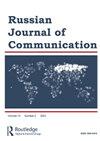Environmental issues in Russian cities: towards the understanding of regional and national mass media discourse
Q1 Social Sciences
引用次数: 7
Abstract
ABSTRACT Based on the media discourse analysis of twelve national and six regional Russian online mass media, the study provides critical reflections on the environmental media coverage across two Russian cities following environmental themes including air and water pollution, waste, sustainable transport, energy, environmental civic engagement, and organic food. The findings suggest that the commonalities of the media coverage include the distribution of diagnostic and prognostic framing of motivational, informational articles over analytical, and the domination of discourses of ‘sustainable innovations’, ‘modernisation’, ‘environmental alarmism’ and ‘environmental conflicts’. The differences include the higher coverage of the city of Moscow and pro-governmental journalists in the national media in contrast to coverage in the regional press where the voices of environmental activists and non-governmental organisations are presented equally alongside those of the pro-governmental journalists. Collectively, the results demonstrate that media coverage does not accurately reflect the complex issues of urban stakeholders’ relationship with environmental conflicts which are inevitable in the context of Russia’s continuous reliance on the hydrocarbon sector.俄罗斯城市的环境问题:对地区和国家大众媒体话语的理解
本研究基于对俄罗斯12家全国性和6家地区性在线大众媒体的媒体话语分析,对俄罗斯两个城市的环境媒体报道进行了批判性反思,涉及的环境主题包括空气和水污染、废物、可持续交通、能源、环境公民参与和有机食品。研究结果表明,媒体报道的共性包括对动机、信息性文章的诊断和预测框架的分布,而不是分析性文章,以及“可持续创新”、“现代化”、“环境危言耸听”和“环境冲突”等话语的主导地位。不同之处在于,国家媒体对莫斯科市和亲政府记者的报道较多,而地区媒体对环境活动人士和非政府组织的报道与亲政府记者的报道一样多。总的来说,结果表明,媒体报道并没有准确反映城市利益相关者与环境冲突的关系的复杂问题,这在俄罗斯持续依赖碳氢化合物部门的背景下是不可避免的。
本文章由计算机程序翻译,如有差异,请以英文原文为准。
求助全文
约1分钟内获得全文
求助全文
来源期刊

Russian Journal of Communication
Social Sciences-Political Science and International Relations
自引率
0.00%
发文量
0
期刊介绍:
Russian Journal of Communication (RJC) is an international peer-reviewed academic publication devoted to studies of communication in, with, and about Russia and Russian-speaking communities around the world. RJC welcomes both humanistic and social scientific scholarly approaches to communication, which is broadly construed to include mediated information as well as face-to-face interactions. RJC seeks papers and book reviews on topics including philosophy of communication, traditional and new media, film, literature, rhetoric, journalism, information-communication technologies, cultural practices, organizational and group dynamics, interpersonal communication, communication in instructional contexts, advertising, public relations, political campaigns, legal proceedings, environmental and health matters, and communication policy.
 求助内容:
求助内容: 应助结果提醒方式:
应助结果提醒方式:


